Opopanax Resin (Sweet Myrrh)
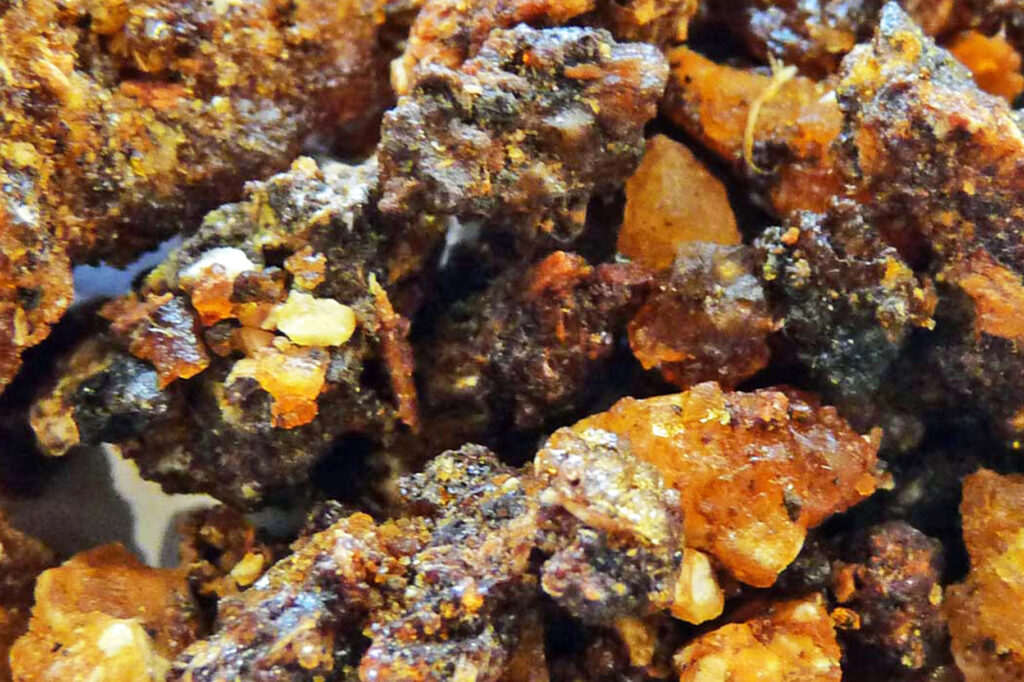
Opopanax Resin (Sweet Myrrh) is an aromatic resin with a sweet, balsamic fragrance. It is derived from the Commiphora species, primarily found in regions like Somalia and Ethiopia. The resin has been traditionally used in incense, perfumes, and medicinal applications. Opopanax is prized for its grounding and calming properties, making it a popular choice in spiritual and healing practices. The resin can be easily harvested from the tree bark, where it oozes out and hardens upon exposure to air.
1. Size:
- The resin forms in irregular, small to medium-sized chunks, typically ranging from a few millimeters to several centimeters. When fresh, the resin is soft and sticky, but it hardens over time.
2. Color:
- Opopanax Resin generally has a golden-brown to amber hue. The color can darken with age, becoming more opaque and less translucent as the resin matures.
3. Texture:
- The texture of the resin is sticky and pliable when fresh, but it becomes brittle and hard as it ages. The surface of the resin is often rough and granular, with a crystalline appearance.
4. Fragrance:
- Opopanax is known for its sweet, warm, and balsamic scent. The fragrance is rich and complex, often used in perfumes and incense for its calming and grounding properties.
5. Uses:
Opopanax Resin is a valued ingredient in perfumery, adding depth and warmth to fragrance compositions. Its sweet and balsamic notes are often used in base notes to enhance longevity and complexity.
The resin is commonly burned as incense in spiritual practices. It is believed to purify the air, protect against negative energies, and create a meditative atmosphere.
Opopanax is used in aromatherapy to reduce stress, alleviate anxiety, and promote relaxation. Its calming properties make it a popular choice in essential oil blends for emotional and mental well-being.
In traditional medicine, Opopanax is applied to the skin to treat wounds, cuts, and inflammation due to its antiseptic and healing properties.
The resin’s soothing aroma is used in meditation practices to enhance focus and deepen spiritual connections.
6. Habitat:
- Opopanax Resin is harvested from Commiphora trees that thrive in arid, semi-desert regions, particularly in Somalia and Ethiopia. These trees are well adapted to the harsh, dry conditions, making the resin an important resource in these environments.
7. Cultural and Spiritual Significance:
- Opopanax Resin is associated with strength and resilience due to the tough conditions in which the Commiphora trees grow. The resin symbolizes the ability to thrive in challenging environments.
- The resin is highly regarded for its grounding properties in spiritual practices. It is often used in rituals to create a protective barrier against negative energies.
- Opopanax has been used for thousands of years in various religious and spiritual rituals. It was often burned as incense to purify spaces and invoke divine protection.
Spiritual Properties
Grounding and Protection: Opopanax Resin is highly regarded for its grounding properties, making it an excellent tool for meditation and spiritual work. It is often used in rituals to create a protective barrier against negative energies and to foster a calm and peaceful environment.
Enhancing Meditation: The rich, balsamic aroma of Opopanax is believed to deepen meditation and enhance spiritual awareness. It helps to calm the mind and focus the senses, allowing for a deeper connection to one’s inner self and to higher spiritual realms.
Cleansing and Purification: In many spiritual traditions, Opopanax Resin is burned to cleanse spaces, objects, or individuals of negative influences. Its smoke is thought to purify the aura and surroundings, promoting spiritual clarity and emotional healing.
Symbol of Strength and Resilience: The Commiphora trees that produce Opopanax Resin grow in harsh, arid environments, symbolizing strength, resilience, and the ability to thrive in challenging conditions. The resin is therefore associated with these qualities in spiritual contexts, providing support and empowerment to those who use it in their practices.
Medicinal Properties
Anti-inflammatory and Antiseptic: Opopanax Resin has been traditionally used for its anti-inflammatory and antiseptic properties. It is often applied to wounds, cuts, and sores to promote healing and prevent infection.
Respiratory Health: The resin is known for its expectorant properties, making it useful in treating respiratory conditions such as bronchitis, asthma, and coughs. It helps to clear mucus and ease breathing.
Pain Relief: Opopanax has analgesic properties that can be used to alleviate pain, particularly in conditions like arthritis, muscle pain, and joint inflammation. It is often included in balms and ointments for its soothing effects.
Stress Reduction and Relaxation: In aromatherapy, the sweet and warm aroma of Opopanax Resin is used to reduce stress, alleviate anxiety, and promote relaxation. It is often used in essential oil blends aimed at calming the mind and body.
Digestive Aid: Traditionally, Opopanax was used to support digestion, particularly in cases of bloating and indigestion. It is believed to have mild carminative properties that can help soothe the digestive tract.
Allergic Reactions
Opopanax Resin is generally considered safe for handling and consumption in small quantities. It is commonly used in traditional medicine and as a food flavoring agent in some cultures.
- Allergic Reactions: Some individuals may experience allergic reactions when handling or using Opopanax Resin. These reactions could include skin irritation, redness, or rash, particularly in those with sensitive skin. Inhalation of the resin’s smoke may cause respiratory discomfort in people with asthma or other respiratory conditions.
- Dermatitis: Prolonged skin contact with the resin might lead to dermatitis, a condition characterized by inflamed, itchy skin. It’s recommended to use gloves when handling the resin if you have sensitive skin or a history of dermatitis.
- Digestive Discomfort: While generally safe in small quantities, ingesting large amounts of Opopanax Resin may cause nausea, vomiting, or stomach cramps. It’s advisable to use it sparingly in herbal remedies or under the guidance of a healthcare professional.
- Uterine Stimulation: Opopanax Resin should be avoided by pregnant or breastfeeding women due to the potential risk of uterine stimulation, which could lead to complications during pregnancy.
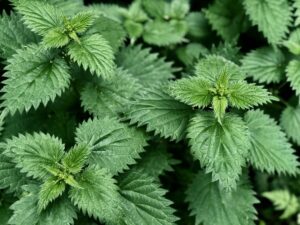
Nettle Leaf
Nettle Leaf Nettle Leaf is a versatile herb known for its numerous health benefits and uses in traditional medicine. It is often used for its

Vanilla Bean
Vanilla Bean Vanilla Bean is the fruit of the tropical orchid Vanilla planifolia, native to Mexico and now cultivated in various tropical regions around the
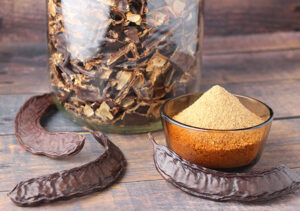
Raw Carob Powder
Raw Carob Powder Raw Carob Powder is derived from the dried pods of the carob tree (Ceratonia siliqua). The pods are ground into a fine,

Lavender-Infused Herbal Cookies for Relaxation
Lavender-Infused Herbal Cookies for Relaxation These lavender-infused cookies provide a delicious way to relax and unwind. Perfect for a calming snack before bed or a
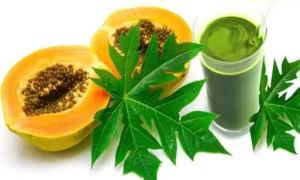
Papaya Leaf
Papaya Leaf Papaya Leaf (Carica papaya) comes from the tropical fruit tree known for its large, deeply lobed leaves. While the fruit of the papaya
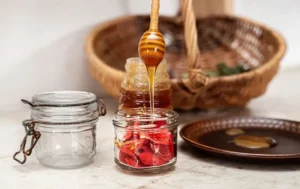
Herbal-Infused Protection Honey
Herbal-Infused Protection Honey This herbal-infused honey is perfect for enhancing spiritual protection and promoting healing energy when used in meals or teas. It creates a